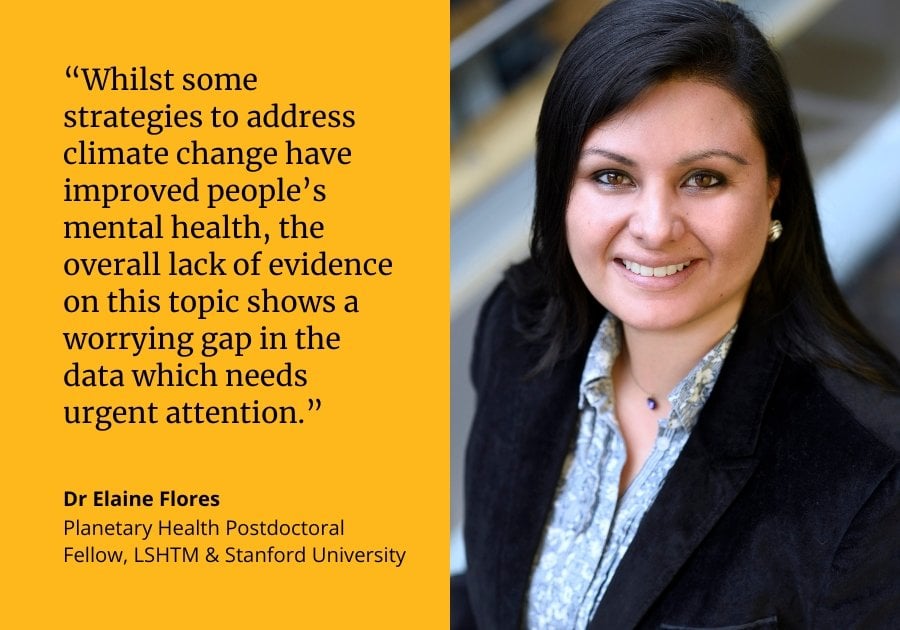
Dr Elaine Flores Quote Card
Climate change has already impacted the health and wellbeing of around 5 billion people globally, and the consequences of climate change on mental health are profound and interlinked. More frequent extreme weather disasters, disruptions to food and water security, displacement from home environments, loss of livelihoods and belongings, and damage to community infrastructure can all contribute to trauma, depression, anxiety disorders, substance abuse, and declines in psychosocial wellbeing (state of mental, emotional and social health).
The severity of these impacts is particularly pronounced in low- and middle-income countries (LMICs), which are the most vulnerable to climate risks yet have the fewest resources to cope with and recover from them. Unfortunately, research on the mental health effects of climate interventions in these regions is severely lacking, highlighting the urgent need for further investigation.
The overarching purpose of my Planetary Health Fellowship project was to investigate the psychosocial and wellbeing impacts of climate change and explore potential community-based solutions, using Peru as a case study. As part of this work, we carried out a systematic review to assess the existing evidence on how climate change mitigation and adaptation responses affect psychosocial and wellbeing outcomes in low- and middle-income country populations.
After a comprehensive search of the literature, we identified just 15 studies published from 2013 to 2022 evaluating mental health or wellbeing outcomes related to climate mitigation or adaptation strategies implemented in LMICs.
The interventions assessed were diverse: cash transfers, disaster preparedness training, relocation due to sea level rise, anti-deforestation initiatives, and efforts to reduce indoor air pollution. Around half found significant improvements in conditions like depression and anxiety, psychosocial distress, quality of life, self-efficacy, and other wellbeing measures among beneficiaries.
However, the other half revealed mixed results or no evidence of effects, with local sociocultural and economic factors playing a key role in intervention success. Numerous limitations were identified in the available evidence, including a lack of validated mental health assessments, very limited evaluations of the impacts of mitigation strategies, hardly any data separated by gender despite the disproportionate climate burden facing women, and unclear mechanisms linking specific intervention elements to mental health outcomes.
While it is encouraging that some climate strategies demonstrated mental health benefits, the overriding lack of rigorous evidence highlights a concerning data gap requiring urgent action.
Based on the available evidence, we propose recommendations across four areas:
- Monitoring and surveillance in mental health: Addressing gaps in mental health data collection through national health surveys, electronic records, and data from implemented mental health programmes alongside global monitoring initiatives of climatic hazards is vital. However, the analysis must account for limitations such as overrepresentation of data from care-accessing groups or larger countries with organised efforts.
- Informing climate change responses and mental health policies: Leveraging available data to prioritise regions facing the most significant climate and mental health burdens should inform the environmental and health public sectors. While climate impacts on health are undoubtedly well-documented, their effects on mental health likely vary, needing tailored, context-specific strategies.
- Prioritising vulnerability: Efforts to reduce mental health vulnerabilities among already marginalised groups like women, youth, global Indigenous Populations, the elders, and those living with a disability or underserved are critical, as they disproportionately bear climate impacts. Participatory policies addressing sociocultural and economic stressors should be co-designed with at-risk communities to maintain representation of diverse voices and targeted adaptation measures.
- Communications and knowledge translation: Developing campaigns to raise awareness among sectors like business and civil society about the consequences of climate change on individual and community mental health and wellbeing and the potential health benefits of climate strategies. Documenting implementation barriers and facilitators will allow successful strategies to be replicated regionally or globally.
This research has identified overlooked mental health challenges especially for vulnerable groups, and lays the groundwork for developing community-based solutions that address the complex connections between psychosocial wellbeing, gender dynamics, and environmental issues.
Comprehensive global analyses that quantify the mental health burden of the climate crisis can play a pivotal role in shaping policies that address this underexplored yet critically important challenge. It is crucial that we develop appropriate methods, metrics, and terminology, we learn from existing knowledge, and co-create transdisciplinary solutions with affected communities to build resilience holistically.
Publication
Elaine C Flores, Laura J Brown, Ritsuko Kakuma, Julian Eaton and Alan Dangour. Mental health and wellbeing outcomes of climate change mitigation and adaptation strategies: a systematic review. Environmental Research Letters. doi.org/10.1088/1748-9326/ad153f
If you enjoyed this article and would like to build a career in global health, we offer a range of MSc programmes covering health and data, infectious and tropical diseases, population health, and public health and policy.
Available on campus or online, including flexible study that works around your work and home life, be part of a global community at the UK's no.1 public health university.
